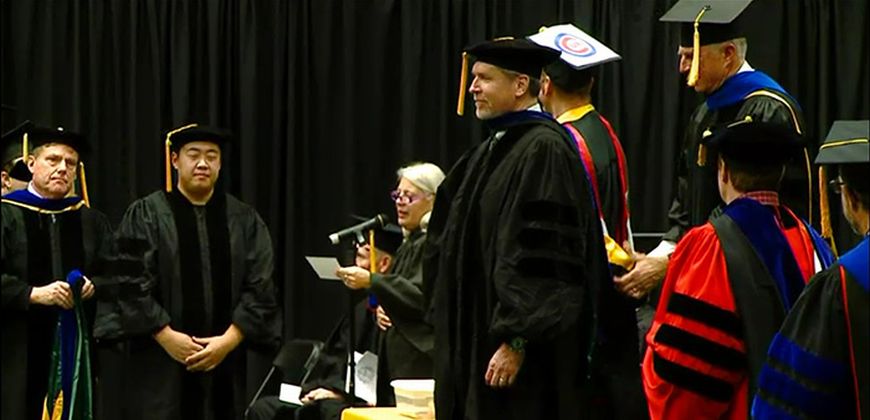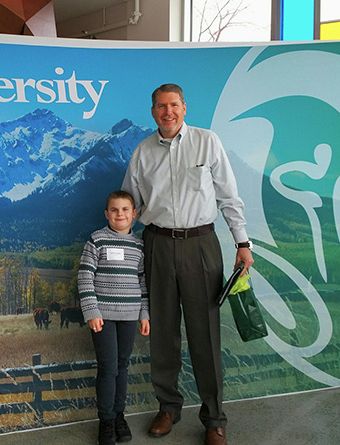
Brian Gallagher never had, as he calls it, the “luxury” of being a full-time student. He worked full time while earning his associate’s, bachelor’s, and master’s degrees — and his Ph.D. was no exception. Gallagher is a senior vice president for the Arlington, Virginia-based defense contractor CACI, and recently was the first online student to graduate with a Ph.D. from Colorado State University’s systems engineering program.
Like many other students who work full time, Gallagher said without the online option he may never have been able to fit a doctorate into his already busy schedule.
“When I first considered getting a Ph.D. in the mid-90s, online programs didn’t exist,” he said. At the time he was working as a director at the Software Engineering Institute at Carnegie Mellon University and wanted to attend a program there. “But,” he said, “as with most universities at that time, they didn’t cater very well to working adults.”
Fast forward almost two decades. After working several other jobs and moving to Washington D.C., Gallagher discovered CSU’s online systems engineering program, led by the renowned Dr. Ron Sega. He knew he had found the right opportunity to earn his Ph.D.
“I had known Dr. Sega previously when he was serving as Under Secretary of the Air Force. Knowing that he was part of this program really, for me, gave a lot of weight to CSU,” Gallagher said.
Online learning in real-time

While there are a number of different ways online programs can work, Gallagher chose CSU’s systems engineering program because “it was kind of a hybrid approach. There were formal class times, so I would log in and watch lectures as they were happening on campus,” he said. “Then there was also a component of participating online. With that hybrid approach of both the online portion as well as the interaction of students together in a single area, I felt like I was there in the class, just like everyone else. I wasn’t treated differently. I didn’t have lower expectations. I felt like I was right there participating in the classroom.”
The program also accommodated his schedule well.
“I could finish a whole day of work, have time to get home and interact with my family before classes would start,” he said. “They also offer the opportunity to watch lectures asynchronously. So if you missed it, if you were working or traveling, all the classes were recorded. But most of the time I watched live. It was kind of nice because my wife and my family knew that this was the time that I would be sequestered away to do the course. Usually, I would take either Saturday or Sunday to work on projects.”
A richly interactive learning experience
“We did a lot of projects for our classwork,” Gallagher said. “I really liked that my project teammates were from all over the country. I would be working with a Navy nuclear engineer and an Air Force pilot, and somebody from another contractor, all in different parts of the country. We were able to come together with the course content, learn about each other, learn about each of our backgrounds, and work together. We felt like we got to know each other really well.”
As for Gallagher’s dissertation, he had many opportunities to meet with his advisor, Dr. Sega, both in person and long distance. Gallagher said Sega “came to D.C. for conferences and meetings a lot, and while he was here we would get together and meet about my research. We would do telephone calls some months and other months we got to meet in person.”
This wasn’t an uncommon experience for online students in the program. Sega said, “Though our program doesn’t require students to be on campus, more often than not, you’ll find that students and faculty do get face-to-face time somewhere, somehow during the course of the program.”
As Gallagher noted, “the need for systems engineers continues to outpace the ability of our educational system in the United States to meet that demand. At CACI, we are always looking for engineers with advanced systems engineering degrees to meet the challenging needs of the customers we support. The program at CSU helps fill that gap with the highest quality graduates ready to meet those challenges on day one.”
More about the program
The systems engineering Ph.D. program, which was first offered online in 2012, is continuing to reach people across the country, from California to Ohio, and elsewhere. There are currently about 80 students in the program, and many are accomplished professionals, including CEOs and military personnel. Sega said most people enter the program to enhance their current careers. “The students we currently have are generally looking forward to just doing a better job in the current company they’re in, helping to change the strategic direction or how they do things in their current company,” he said.
Learn more about CSU’s online Ph.D. in Systems Engineering.